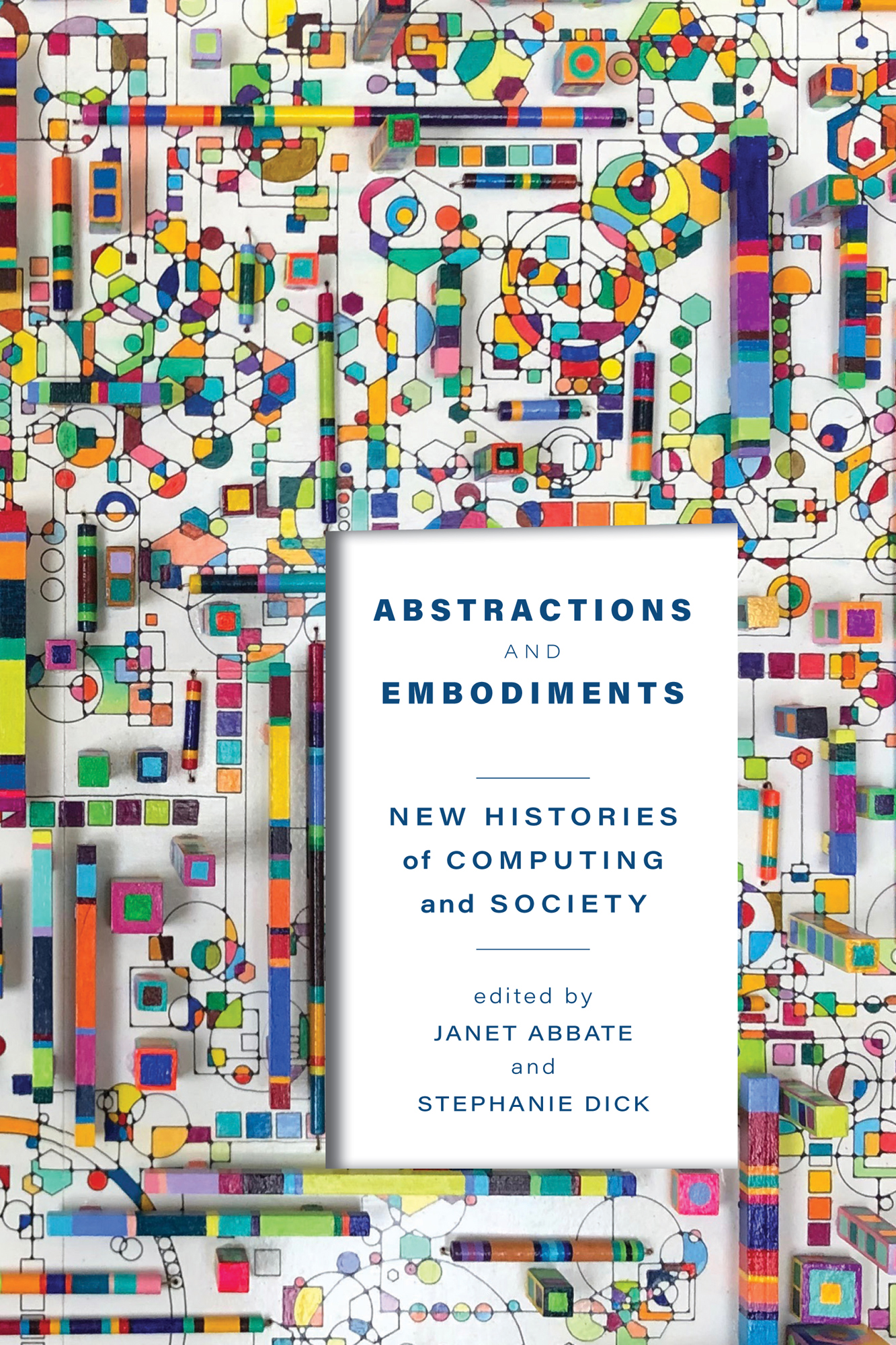Janet Abbate - Abstractions and Embodiments
Here you can read online Janet Abbate - Abstractions and Embodiments full text of the book (entire story) in english for free. Download pdf and epub, get meaning, cover and reviews about this ebook. year: 2022, publisher: Johns Hopkins University Press, genre: Politics. Description of the work, (preface) as well as reviews are available. Best literature library LitArk.com created for fans of good reading and offers a wide selection of genres:
Romance novel
Science fiction
Adventure
Detective
Science
History
Home and family
Prose
Art
Politics
Computer
Non-fiction
Religion
Business
Children
Humor
Choose a favorite category and find really read worthwhile books. Enjoy immersion in the world of imagination, feel the emotions of the characters or learn something new for yourself, make an fascinating discovery.

- Book:Abstractions and Embodiments
- Author:
- Publisher:Johns Hopkins University Press
- Genre:
- Year:2022
- Rating:3 / 5
- Favourites:Add to favourites
- Your mark:
- 60
- 1
- 2
- 3
- 4
- 5
Abstractions and Embodiments: summary, description and annotation
We offer to read an annotation, description, summary or preface (depends on what the author of the book "Abstractions and Embodiments" wrote himself). If you haven't found the necessary information about the book — write in the comments, we will try to find it.
Abstractions and Embodiments — read online for free the complete book (whole text) full work
Below is the text of the book, divided by pages. System saving the place of the last page read, allows you to conveniently read the book "Abstractions and Embodiments" online for free, without having to search again every time where you left off. Put a bookmark, and you can go to the page where you finished reading at any time.
Font size:
Interval:
Bookmark:

ABSTRACTIONS AND EMBODIMENTS
STUDIES IN COMPUTING AND CULTURE
Jeffrey R. Yost and Gerardo Con Diaz, Series Editors
New Histories of Computing and Society
EDITED BY
JANET ABBATE
AND
STEPHANIE DICK

JOHNS HOPKINS UNIVERSITY PRESS | Baltimore
2022 Johns Hopkins University Press
All rights reserved. Published 2022
Printed in the United States of America on acid-free paper
9 8 7 6 5 4 3 2 1
Johns Hopkins University Press
2715 North Charles Street
Baltimore, Maryland 21218-4363
www.press.jhu.edu
Library of Congress Cataloging-in-Publication Data
Names: Abbate, Janet, editor. | Dick, Stephanie, 1985 editor.
Title: Abstractions and embodiments : new histories of computing and society / edited by Janet Abbate and Stephanie Dick.
Description: Baltimore : Johns Hopkins University Press, 2022. | Series: Studies in computing and culture | Includes bibliographical references and index.
Identifiers: LCCN 2021053802 | ISBN 9781421444376 (paperback) | ISBN 9781421444383 (ebook)
Subjects: LCSH: ComputersSocial aspects. | Computers and civilization.
Classification: LCC QA76.9.C66 A27 2022 | DDC 303.48/34dc23/eng/20211122
LC record available at https://lccn.loc.gov/2021053802
A catalog record for this book is available from the British Library.
Special discounts are available for bulk purchases of this book. For more information, please contact Special Sales at .
Our first thanks go to all of the authors who contributed their insights and hard work to this volume; their scholarship is transforming the history of computing to serve urgent and expanding intellectual goals and community needs. We gratefully acknowledge Valrie Schafer and Nathan Ensmenger, who provided invaluable feedback on our introduction; Matt Priestly and Marc Aidinoff for their thoughtful comments on the afterword; Gerard Alberts for drawing our attention to the potential for focusing on embodiment; and the anonymous reviewers for Johns Hopkins University Press. We also acknowledge the fine work of copyeditor Michael Baker and indexer Enid Zafran. Matt McAdam at Johns Hopkins University Press shepherded this project through changes and disruptions with calm encouragement.
Stephanie would like to thank her history of computing graduate studentsespecially Sam Schirvar, Zach Loeb, Cheryl Hagan, Sam Franz, Kelcey Gibbons, Aaron Mendon-Plasek, and Katya Babintsevafor their brilliant scholarship and for countless conversations about the history of computing from which I have learned so much. Janet would like to thank Virginia Tech for providing a grant for publication expenses; Trevor Croker for research support in the initial planning stages; and Tom and Wendy for their love and patience.
ABSTRACTIONS AND EMBODIMENTS
Janet Abbate and Stephanie Dick
Computers are good to think with. This is the claim of technologists who created whole industries and academic fields around what it is possibleand not possibleto do with computers. Computers have been centered in discourse and practice everywhere from politics and art to science, law, and activism. They have proven powerful for historical thinking as well: computers concretize social forces and logics that may otherwise be harder to see, to understand, to change. Public attitudes toward computers have revealed deep contradictions at the heart of twentieth- and twenty-first-century life: acclaimed as liberatory, they are also condemned as instruments of control that increasingly dictate the contours of human life; often seen as revolutionary, they also reinforce existing power structures; heralded as engines of innovation, they are also conservative, lingering manifestations of nineteenth-century industrial thinking and Cold War militarism. Computers have been framed both as a mirror for the human mind and as an irreducible other, so different from people that humanness must be defined (and protected) against them. Historians of computing return again and again to these contradictions: How can a technology be both old and new? Innovative and conservative? Democratic and authoritarian? Historical scholarship has shown that these seeming contradictions often reveal deeper structures. Computers can serve both liberation and control because some peoples freedom has historically been predicated on controlling others. Computers can be both alike and unlike human beings when you acknowledge the relative and changing definitions of humanness in history. When historians think with computers, we are called to confront and explore foundational structures, binaries, logics, and tensions in modern life.
This volume puts at its center one of the core binaries within computing: between abstractions and embodiments, ideas and materiality, mind and body, software and hardware. On the one hand, computers are inherently abstract: they are informed by the history of Boolean logic, formal languages, and mathematically defined procedures. On the other hand, computing is done by machinery and peopleit is entangled with global systems of resource extraction, environmental control, and gendered and racialized labor. Many abstract concepts in computingalgorithm, network, systemare inherited from the past, and indeed were abstracted from particular cultural, economic, and material contexts. Our goal is not to dissolve this tension or to suggest that abstraction is always actually material, but rather to explore how, historically, the material conditions of computing and the abstract ideas and stories that shape its use are co-produced.
Thinking with computers also means thinking about people, with whom computers have such intimate and myriad relations. Computing technologies have become constant companions, mediating the interactions people have with themselves, each other, the State, corporations, and the world. Computing has also always been positioned and its capacities defined in relation to the human mind and body, a set of connections we highlight in this volume. Computers have been imagined as a mirror of, or competitor to, the human mind, and have also been promoted as a way to augment the brain or body. While historians have explored in some depth the discourses of giant brains and thinking machines, physical relations between computing machines and embodied users have been relatively neglected. Centering bodies in the history of computing also foregrounds issues of labor, disability, gender, and race that are harder to see in machine-focused histories. Behind the abstractions and the materialitiesbehind the mathematical and technological dimensions of computing, from algorithms to transistors, that have received so much attentionthere are communities and laborers, identities and experiences, that have not, until recently, received the historical attention that they deserve.
Finally, thinking with computers compels historians to think about power. From the earliest digital computers built by military agencies during World War II to the algorithms that increasingly control our lives, computing has been funded by powerful government and private sector actors and harnessed to their political and economic agendas. Yet computing technology, and the skill to wield it, have an equally long history of enabling distributed, countercultural, bottom-up, subaltern, and oppositional power. Historians of computing have a rich corpus of studies that integrate technical and social sources of power and opportunity. A new generation of scholars is deepening those inquiries by bringing computer history into conversation with analyses of power relations through frameworks of colonialism, disability, and race. Throughout the volume, we propose that to think with computers is to think about
Font size:
Interval:
Bookmark:
Similar books «Abstractions and Embodiments»
Look at similar books to Abstractions and Embodiments. We have selected literature similar in name and meaning in the hope of providing readers with more options to find new, interesting, not yet read works.
Discussion, reviews of the book Abstractions and Embodiments and just readers' own opinions. Leave your comments, write what you think about the work, its meaning or the main characters. Specify what exactly you liked and what you didn't like, and why you think so.










